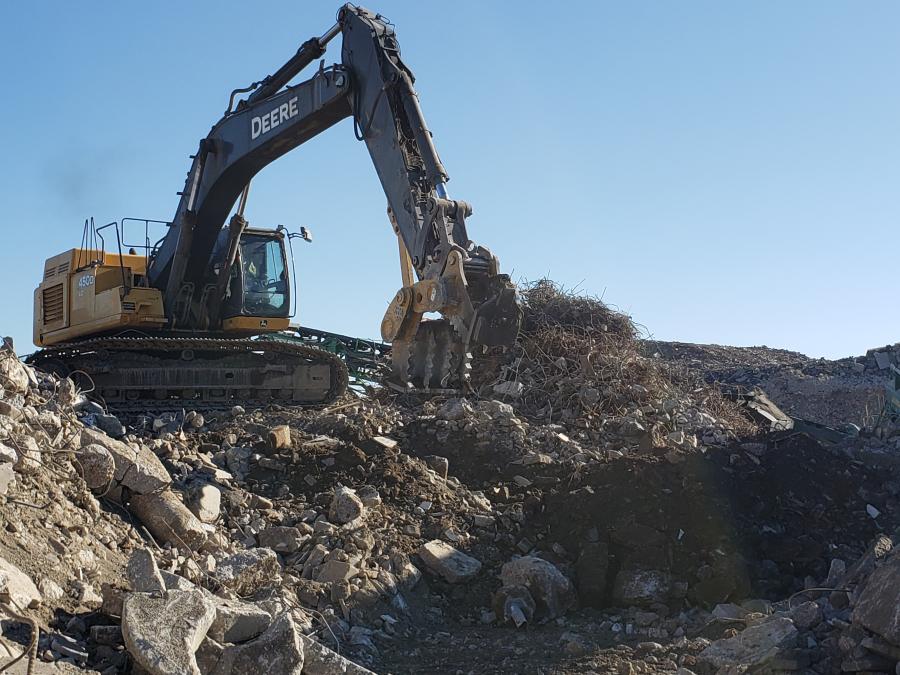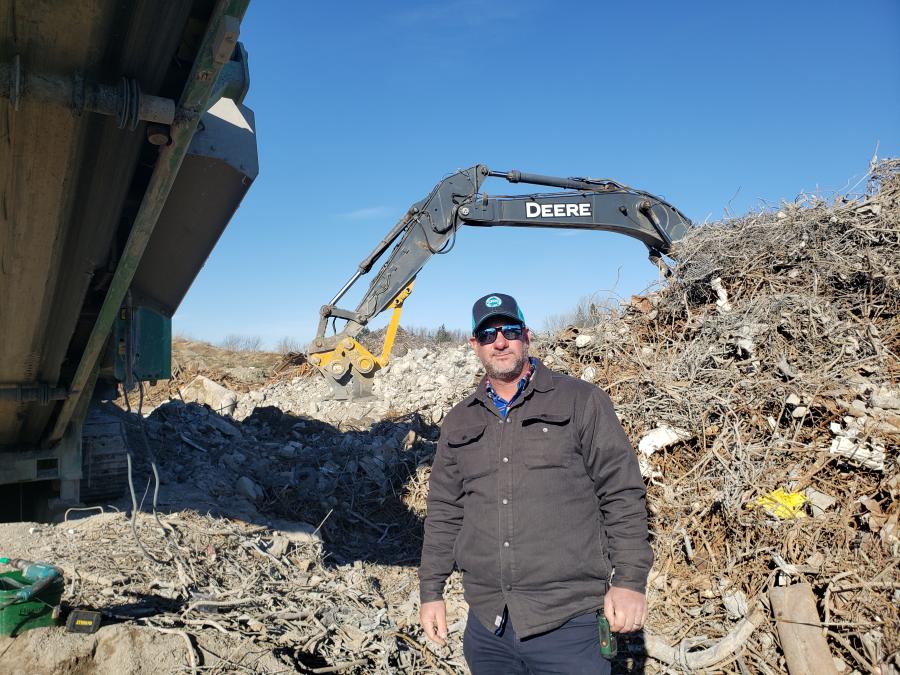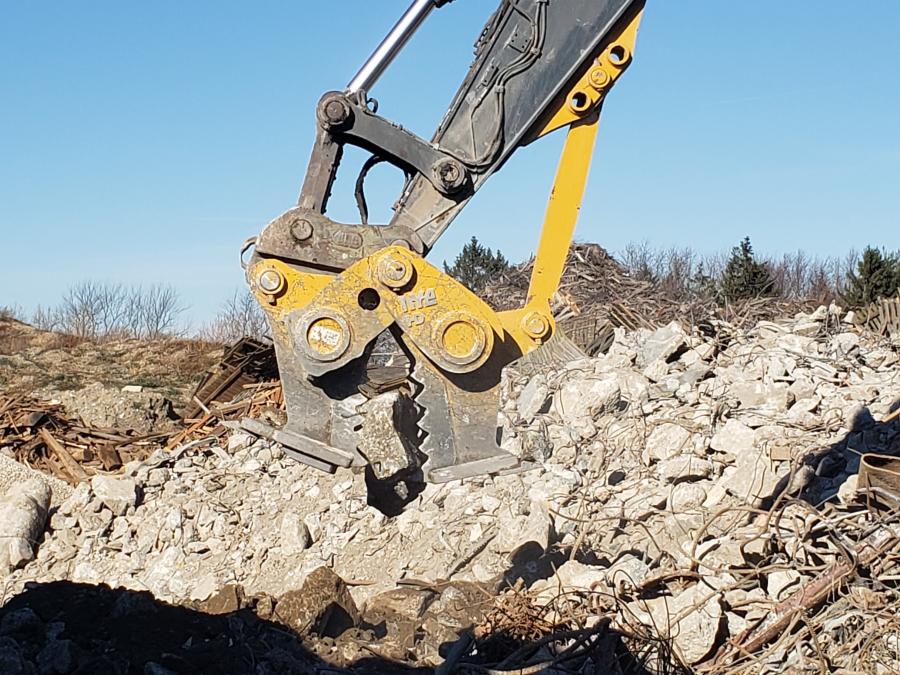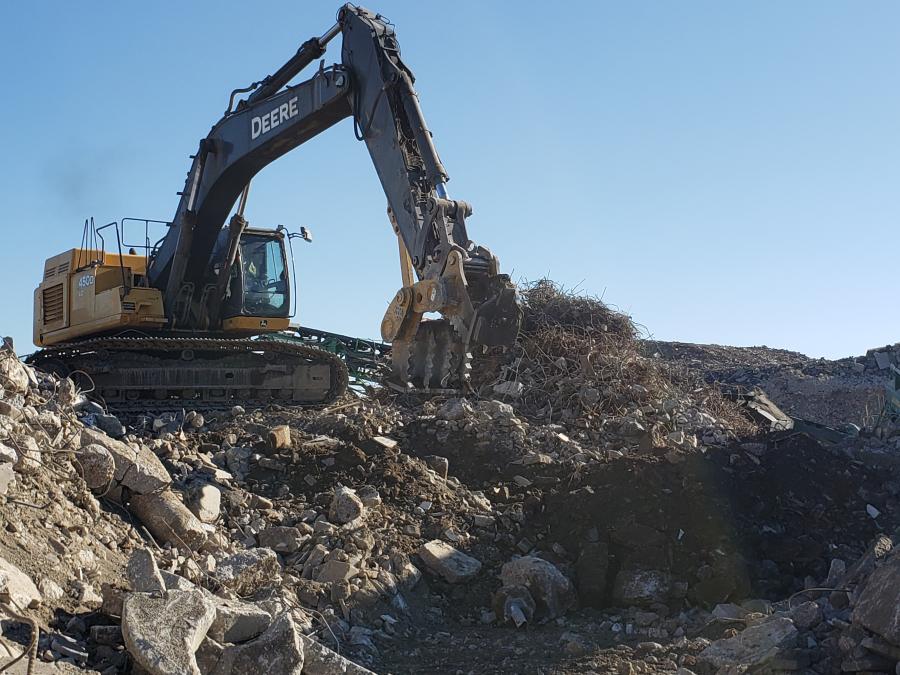The Nye pulverizer is attached to a John Deere 450 DLC excavator.
(CEG photo)
Dan Powell, owner of CHDS (Concrete, Horticulture, Dirt and Stone) headquartered in Wheeling, Ill., is used to hard work. He also needs his machines to work hard.
He started his first company, Powell Inc., at age 18, when he graduated from high school. He began doing residential flat work concrete and from there, the company slowly evolved.
"I started with a six-wheeled dump truck to carry out broken concrete from jobs," said Powell. "When I didn't need the truck any longer, I hired it out to another guy — just to keep it busy and make some money from it. That went well, so I added on a second six-wheeler, then two semis and before you know it, we were running almost 150 semi dump trucks between my company and all the brokers that I had."
Powell Inc. quickly became one of the largest dump truck companies in Cook and Lake counties.
When competing for jobs, dump location can give any company an edge. At the time, Powell didn't have the funds to buy land, but was resourceful.
"I wound up going and looking for the old, rickety signs on land that was up for sale," he said. "I didn't have the money at the time to buy it, but I knocked on the door and made a deal with the guy."
In exchange for exclusive rights to the land, Powell took care of all the permitting, engineering, design, all waivers and padded out the site for free. This was his first land deal in Fox Lake, Ill.
"That gave us the edge on trucking because it became our own clean dirt dump," he said. "In the meantime, we took that imported soil and built up the pads for the guy, which made it sell quickly and for more money."
As time went on, Powell eventually started to phase out the trucking side of the business and began buying land to create a clean soils sites. With regulations making it tougher, it became harder and harder to permit these sites.
"We wanted to do something more sustainable that was already in our wheelhouse, so we began the recycling side of the business," he said.
Powell started with concrete crushing and expanded the business to the current facility on a 54-acre site in Round Lake, Ill. At this site, contractors bring various materials to be recycled, processed and sold.
"We are a free concrete dump," said Powell. "We give a $5.00 credit on the account per semi load of appropriate concrete that's brought in. All stone, mulch and topsoil products are sold at a good, wholesale price. We set the market for fair pricing on the material so we can make money and our customers can make money on their jobs. That's my theory of doing business and that's what attracts people — they can make money on their jobs and win their bids."
Broken concrete is crushed into state-approved stone to be used by the Illinois Department of Transportation or other municipalities. This material must be crushed per state guidelines for gradation. The state inspects and approves this stone every five to ten thousand tons.
"Any time we have a village job or anything that requires state-approved material, we have a certificate, producer number and those inspection reports," said Powell.
Broken asphalt, cinder block and brick are crushed to a proper gradation of CA6 3-in. and sold as commercial grade. Wood waste, trees and branches are triple ground into premium mulch and topsoil. Topsoil dumps are screened, pulverized and sold to landscapers, excavators and other customers who need it.
"Some materials we don't produce are imported so CHDS can be a one-stop shop. If a customer need ¾ in. of virgin clear, we have it," said Powell.
When it comes to the right equipment to process all this material, Powell needs tough machines that will keep up with the task at hand. Recently, a customer suggested he look into National Attachments.
"National Attachments' Nye pulverizer was recommended to me by a customer we do business with," said Powell. "He had purchased one and was very happy with it."
Powell spoke with Gabe Guimond of National Attachments, and together they put specs together and came up with a tool that would make his operation run more smoothly — the Nye CP47 concrete pulverizer.
"Gabe was really easy to talk to and National Attachments was super easy to deal with," said Powell. "It didn't take more than 15 minutes to put together what we needed. They emailed me a price back right away."
The CP4 series pulverizers are the company's ninth generation design and is built with three different grades of quenched and tempered alloy steel to provide strength, toughness and wear resistance. The solid AR500 teeth are welded to prevent them falling out and the ripper option features a four-position ripper shank for sorting, prying and flipping. Powell's model is the CP47 3 over 4 pulverizer, which allows for greater cracking force on thicker materials.
"It took some time for manufacturing, because they built it on order," said Powell. "Once we got it, we welded our brackets up on the excavator. We got it with the quick connect, so it's a little easier for us, but it exceeded our expectations. We had some high expectations because of the recommendations."
The Nye pulverizer is attached to a John Deere 450 DLC excavator (purchased from West Side Tractor Sales). It crushes the concrete and removes any rebar. The material is then sent to a McCloskey J45 portable crushing plant with a McCloskey screener.
"The Nye pulverizer saves us so much wear and tear on the crushing units themselves," said Powell. "It helps get the rebar out, helps keep belts from getting ripped constantly and the production time off the crusher just becomes so much greater as you preprocess the material. I've only had it for a few weeks and I'm already really happy with the thing. It even tears through product that was set aside and was unusable for us until we got the jaw."
As for the bottom line, Powell knows the Nye concrete pulverizer will pay off long term.
"It definitely saves labor and wear and tear," he said. "At the end of the day it will improve the bottom line. Just from what we've done so far, it will help create more usable product and it should knock down labor and repair."
For more information, visit nationalattachments.com and chdsllc.com. CEG
Today's top stories





















